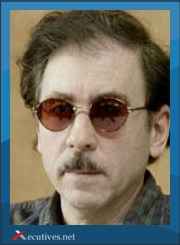
Terry Zwigoff © Armando Gallo / Retna Ltd.
Terry Zwigoff (born May 18th, 1948), is an American film director and screenwriter who began his career making documentaries. „Louie Bluie“ (1985), about an obscure Blues musician, was his first film. It was followed by another documentary, „Crumb“ (1995) which won the Grand Jury Prize at the Sundance Film Festival and also the DGA Award, along with every film critic’s award that year including the New York Film Critic’s Award, The National Society of Film Critics Award, and the Los Angeles Film Critics Award. It’s failure to receive an Oscar nomination, and the subsequent outcry from this omission, led to the Academy Awards changing the way it’s members voted for Documentary Film. „Crumb“ wound up on over 150 Top Ten Lists for 1995 and was called the best film of the year by many critics. „Ghost World“ (2001) was Zwigoff’s first fiction film. He was nominated for an Oscar for Best Screenplay along with co-writer Dan Clowes, while Steve Buscemi and Thora Birch were nominated for Golden Globe Awards. USA Today and the Washington Post called it the best film of the year, and it also wound up on over 150 Top Ten lists. Zwigoff’s next film was „Bad Santa“ (2003) which was Executive Produced and partially written by the Coen Brothers and Zwigoff. It’s star, Billy Bob Thornton, was nominated for a Golden Globe award. Zwigoff’s last film, „Art School Confidential“ (2005) starred John Malkovich, Jim Broadbent, and Angelica Huston. He has two new films in the works, one a comedy and the other a drama. Terry Zwigoff talks in his interview with Xecutives.net founder Christian Dueblin about his career as a filmmaker, and lets us take a glimps into the genius mind of a great director. Terry Zwigoff and Robert Crumb are going to be present at the Basler Gässli Film Festival 2014 organized by Swiss filmmaker Giacun Caduff.
Dueblin: I get the impression that Ghost World reflects a great deal upon you personally: a vital interest in Jazz, in cartoons, comic books, and graphic novels, as well as in bizarre people and outsiders; a loving attention to humorous details; and a concern with younger people trying to leave home, develop their creative potential, and find their own way. Are these interests all part of the mind set of Terry Zwigoff? Am I wrong with this assessment?
Terry Zwigoff: I didn’t feel all that much of a personal connection to the comic „Ghost World“ when I originally read it. I certainly liked it and thought that Enid and Rebecca were well-written characters and I found it humorous … but, I don’t think I ever would have made it into a film were it not for my wife, who kept encouraging me to take it on. For some reason she was pretty insistent about it. Maybe she just wanted me to earn some money and get out of the house, I don’t know. In any case, I introduced myself to Dan Clowes and really liked him and found him very smart and funny, and we became friends, so that helped me want to move forward with the idea as well.
Anyway, in Dan’s comic it’s largely just Enid and Rebecca and a few peripheral characters – there is no „Seymour“ character. When I wrote the screenplay with Dan, I added that character to the story. And I based him somewhat on a comically exaggerated version of myself. Not that it’s at all autobiographical; it’s not. But I did base him on myself in some ways and a bit on my cousin Sherwin, and a bit on Robert Crumb and actually Charles Crumb as well. And I collect old jazz and blues 78s from the 1920s, like Seymour does, so that’s part of the reason that music is in the film. And I’m a bit like Seymour in that I’ve always found it difficult to make a connection. To other people, to the culture, you name it. I generally feel rather angst-ridden and alienated and lonely – often disgusted with society and humanity in general. And that’s what on some level the film is really about – what I strived to do is to make a film that someone else could watch and maybe not feel so all alone in the universe. That they could relate to Seymour and Enid’s thoughts and their dilemmas. That they would be comforted by the fact that somebody out there feels the same way they do about something. You know, when I occasionally see a film or read something in a book and feel a connection to the material, that’s the best feeling in the world. Someone else in the world understands….. So that’s what I strived for.
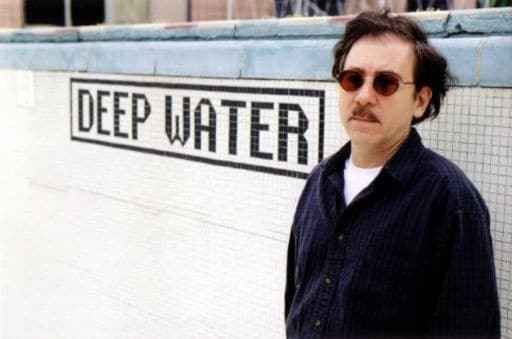
Terry Zwigoff in Art School Confidential (2006)
Dueblin: In this film, the actors seem to be in a state of magnetic repulsion. It is hard to believe that they could come together and live with one another in harmony. The relationship between Enid and Rebecca fails, but also the relationship between Seymour and Dana. How would you describe those repelling relationships, and how did you succeed to present them this way?
Terry Zwigoff: „Magnetic repulsion“ or whatever you want to call it, is just part of being human and living around other people. People are complicated; it’s not always smooth sailing. I don’t see any relationship as a failure, especially when you’re talking about a couple of teenagers like Enid and Rebecca. People mature in different ways at that age, it’s very common, just not so commonly represented in film. I don’t see that as an unhappy ending or a failure. Maybe they reconnect as adults. Who knows? But any rich experience with another person can’t be considered a failure. They’re just kids who’ve found each other, but they’re still not sure how they fit as individuals in the world.
With Seymour and Dana, it’s a little different because that character (Seymour) is very personal to me. I often feel alienated around so called „normal“ people, but I don’t really have the patience for extremely neurotic or bizarre people either – I’m more drawn to the eccentric, but they come with their own problems. They’re more interesting, but also more high maintenance. I often feel like I’m a bridge between those two worlds – I have very honed, specific tastes and I love art and music, but I don’t need the craziness that goes with it. I lead a very stable life and I like to have control of my environment. Seymour is like that too, but he also longs for a connection – so he’s dating, he’s trying to find that in Dana. But of course, it doesn’t work out. She looks good on paper, but she’s not really like him. Enid is more like him in many ways. She’s curious and smart and she has a sense of humor. Maybe if Dana had a sense of humor it would’ve worked out! That’s a rare character trait, and I’ll put up with a lot of nonsense if it’s with someone who makes me laugh.
Dueblin: It seems to me that the actors in Ghost World really some outstanding character traits, and do not merely act and interpret some characters. Is this because they do such a great job acting, or is there more behind such a choice in your form of direction and your choice of actors?
Terry Zwigoff: Well, of course they all did a great job acting. Even someone playing themselves has to be a good actor to make you believe they inhabit whatever artificial scenario you’re putting them in. As a director, when you cast a film, you have to believe they can inhabit your character, and often it’s easier to go with actors who have similar character traits in real life. But I’m all for casting against type too, like Robert De Niro in King of Comedy – a very different character than the edgy mobster he was known for playing. Taking those risks is often more exciting and surprising. Some actors don’t want to do that – others welcome the stretch. In Ghost World, I can’t say that all of the actors were very similar to their characters, but they all did a great job in capturing my intentions for those characters. Some of them needed more direction from me to do that than others.
Dueblin: In the succeeding years since the success of Ghost World in 2001 Scarlett Johansson has become a living legend. She has definitely become a Hollywood A list franchise. What are your memories of working with her? Was it obvious to you that she would become very famous?
Terry Zwigoff: I have fond memories of Scarlett making me laugh every day. She was a very smart, very sarcastic, funny kid. She had a maturity that was well beyond her years, and I thought this might serve her well in the film business. For most kids, fifteen is an awkward year, but she was already far more poised and comfortable with herself than most of the adults I know. Did I know she would become a huge movie star? You really can’t predict these things, but I thought she had a good chance.
Dueblin: You entrusted Jim Broadbent with a fantastic role in Art School Confidential – truly a character actor of his calibre’s dream role! And he delivered an extraordinary performance on the screen.
Terry Zwigoff: I don’t know if it was his dream role, but it was certainly a dream getting to work with him. An enormously gifted and likable man – for some reason he just popped into my brain when it came to casting „Jimmy“ in ASC. I found out both his parents were artists, that was something I didn’t know when I hired him to play this failed bitter artist. Maybe it came in handy, I don’t know. When you hire an actor of that caliber, it makes your job as director very easy. These British theater actors are often so terrific. I do remember one bit of trouble though when I told the studio I wanted to hire him. They said „Another Brit?!“ (I’d already pushed for Max Minghella and Sophia Myles, both British actors). „What do you think you’re putting together here, the Royal Shakespeare Theater Company?!“ I wish……
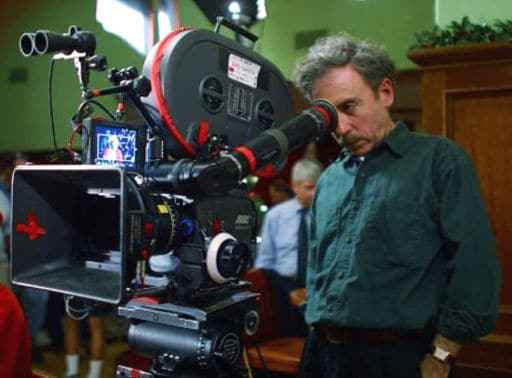
Terry Zwigoff in Bad Santa (2003) © 2003 Dimension Films
Dueblin: How did you reach such a trash-scenery result, that seems to me so very authentic and fits perfectly with the character of Jimmy and vice versa? Could you describe your work with the production designer Howard Cummings, who did such a superb job in this movie and with whom you have worked together various times?
Terry Zwigoff: I had never worked with Howard before, but he was terrific. We started by looking at a lot of photographs and reference material of authentic places where people lived, trying to base things on real life instead of what we’d seen in other films. And of course, we talked a lot about it beforehand…I wanted Jimmy’s place to be a little bit creepy-looking, a little scary, to almost look like he’d been living there with his long-dead mother. You know, maybe have some of her things still there that he’d never thrown out. We did a lot of little things like having a flickering blue light coming from his television – to cheat that a bit so it’s more pronounced, but to have the source of the light seem like it’s coming from the television show that’s playing in the background.
Howard would take a stab at it and show me what he‘d put together and then I would decide what I liked and what I wanted to get rid of. He had lots of things to choose from, which was a big help. I wanted things to be as specific as possible. It was important to me to have exactly the right cardboard coffee cup Jimmy fishes out of the garbage next to his sofa. It had to have the right sound when he uncrumpled it. Little details like that were important to me.
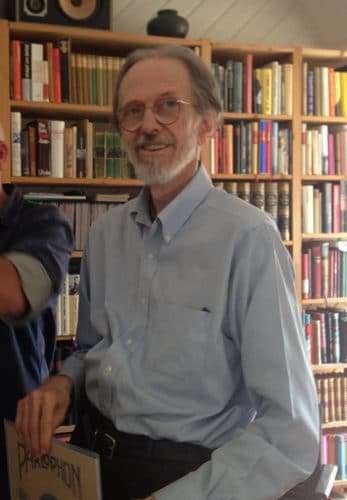
Robert Crumb in Switzerland © Christian Dueblin
Dueblin: Your were always deeply interested in the world of graphic novels and cartoons, and also in the world of Jazz. You have got to know Jazz addicts such like Woody Allen as well as artists like Robert Crumb, a legendary underground comic genius. What holds those two worlds together in your field of interests? Is there something that combines innovative character-driven comic book storytelling and the Jazz world to you?
Terry Zwigoff: I think the commonality with the two is that they’re both considered „low brow“ or „low art“ – both comics and jazz (especially old jazz) had this mass appeal, and I for one was not immune to their charm. I like a lot of „low art,“ even though most critics and taste-makers would imply that „High Art“ represents a more cultivated and educated mind. I’m certainly interested in a good story or characters wherever they come from – whether from Shakespeare or a cheap comic book or Pulp magazine. I don’t have a bias about „low art“ vs. „High Art“ – I like things about both of them.
Dueblin: You are a close personal friend of Robert Crumb, cartoonist, musician and counterculture icon, who will also appear at the Basel Gässli Film Festival 2014 together with you. You have been playing music with him for years; you made a film about his life and loves; and he seems to have affected many aspects of your life. What has motivated you to dedicate so much of your time to documenting and collaborating with this exceptional visual and musical artist?
Terry Zwigoff: Robert and I are old friends. We’re both record collectors and musicians. We like to complain about similar things. I think he’s one of the great artists of our time, which is why I wanted to make the film to begin with. But also because I was interested in his two brothers as well. I don’t think I would have been interested in just making a film about Robert Crumb. But really, the main reason that „Crumb“ took so long to make was because I was waiting for financing, not so much because I wanted to dedicate so much of my time to working on it.
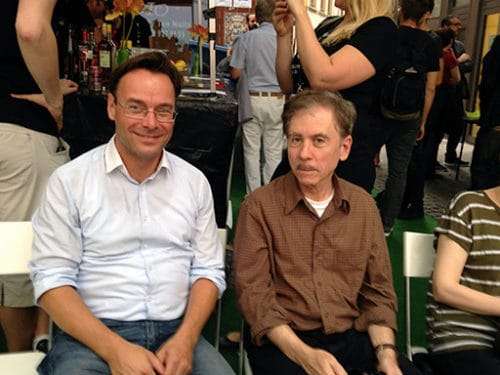
Terry Zwigoff and Christand Dueblin © Christian Dueblin
Dueblin: Howard Suber, living UCLA film legend, explained to me in depth the structure of the film business, and he allowed readers an insightful glimpse behind a big industry that does not differ in moneymaking ways from other industries we know. He also explained that many independent film makers have always been, in a sense, reacting against the mainstream Hollywood system. What are your thoughts about your place as an independent-minded film maker, and what is your personal relationship to the mainstream Hollywood industry?
Terry Zwigoff: Yes, I agree with Mr. Suber – the film business, at least here in the U.S., is about selling a product. Films are treated like mouthwash or paper shredders. It’s all about the profit. They don’t care too much about the artistic side of things, like whether the film is actually good or bad. Whatever crap sells is considered good. And it’s only gotten worse in the last few years. Now the business seems focused on this model that would rather make $100-$200 million budget films for children or mindless adults. They make 70% of their money back outside the U.S., so anything that has too much dialogue or a concept more subtle than Giant Ape Wreaks Havoc („Godzilla“), or Giant Robot Wreaks Havoc („Transformers“), is not likely to get produced. All those great groundbreaking and thoughtful films produced in this country years ago for educated adults….those days seem over at the moment. It’s very difficult to get anything interesting or original produced these days.
Dueblin: You have been invited to the Basler Gässli Film Festival 2014, and you are in the line with other great film makers such as Samir, Gilles Tschudi, Oscar winner Xavier Koller or stuntman and film maker Nash Edgerton, brother of Joel Edgerton. Why did you decide to come to Basel and support Swiss film maker Giacun Caduff and his festival?
Terry Zwigoff: I’ve never been to Switzerland. My wife’s sister said, „it’s so beautiful, it’s hard to believe it’s ever been inhabited by human beings. „That’s the part that sold me on the idea plus Giacun worked as a production assistant on my film „Art School Confidential,“ and he was a good guy.
Dueblin: Dear Mr. Zwigoff, thank you very much for giving your time for this interview. I wish you much success for your film projects and a great time in Switzerland.
(C) 2014 by Christian Dueblin. Alle Rechte vorbehalten. Anderweitige Publikationen sind nur mit ausdrücklicher Genehmigung des Autors gestattet.
______________________________
Links
– IMDb
– Wikipedia
– facebook




